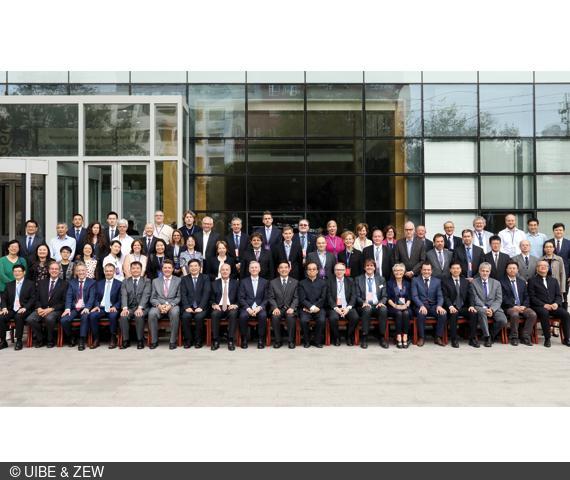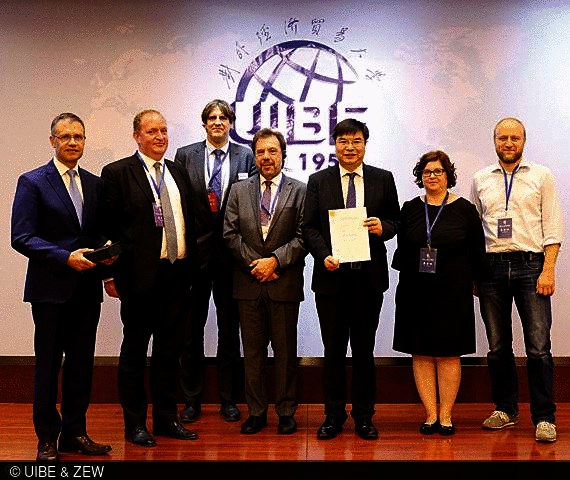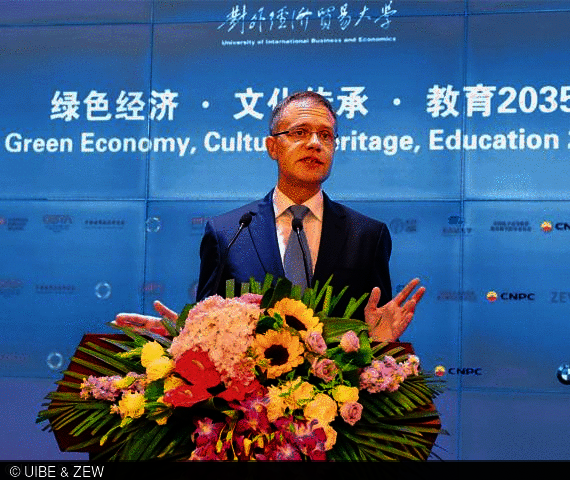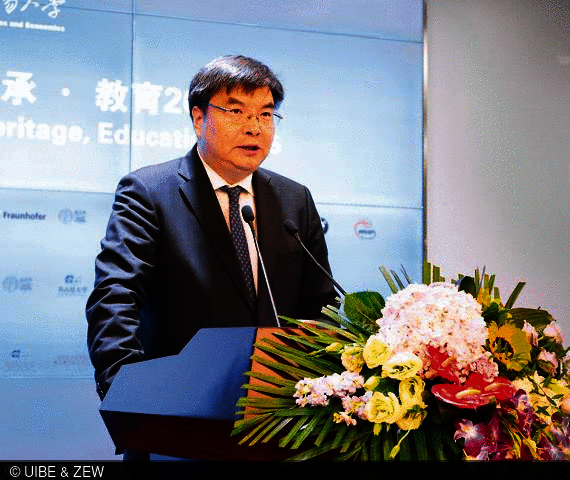ZEW Session on Climate and Innovation Policy at the BHF 2018 in Beijing
EventsThe Centre for European Economic Research (ZEW), the University of International Business and Economics (UIBE), and the Alexander von Humboldt Foundation jointly organised this year's Beijing Humboldt Forum in the Chinese capital on 15–16 September 2018. Within the framework of the event, ZEW organised a session entitled “Assessing the Economic Impact of Environmental and Innovation Policies in China and Europe”. During the session, ZEW researchers engaged in a discussion with international guests regarding the role of environmental, energy and innovation policies for the economic development of the EU and China.
More than 1,000 participants from science, economics, and politics attended the event, which featured insightful presentations on the topic “Green Economy, Cultural Heritage, Education 2035”. In addition to issues related to environmental and innovation policy, the forum also included 18 sessions on topics like the role of rare earths, global value added chains, the mobility of the future, education as well as various cultural issues. ZEW Director and BHF founding member Thomas Kohl received special recognition during the opening ceremony of the Beijing Humboldt Forum, where a ceremony was held to celebrate his reappointment as guest professor. Professor Zhongxiu Zhao, vice president of the UIBE and BHF founding member, was appointed ZEW Research Associate in ZEW’s Research Department “Environmental and Resource Economics, Environmental Management”.
Presentation shed light on European and Chinese environmental and innovation policy
As part of the forum, ZEW organised a session in cooperation with different partners on the economic effects of environmental and innovation policies in China and Europe. The first part of the session was moderated by Professor Andreas Löschel, ZEW Research Associate and professor at the University of Münster, and Professor Ying Fan from Beihang University in Beijing. In the presentation focusing on “Environmental and Energy Policies”, the researchers discussed their latest research findings with the guests. The session also featured a speech held by ZEW Research Associate Professor Bodo Sturm from the Leipzig University of Applied Sciences, who provided insights into his research findings and experiments regarding collaborations in the field of climate protection measures. Professor Ying Fan shed light on the macroeconomic effects of different environmental policies using an equilibrium model. Dr. Sebastian Voigt, deputy head of the ZEW Research Department “Environmental and Resource Economics, Environmental Management”, delivered a speech on the effects of the interactions between climate policies and the EU emissions trading scheme. Professor Shuang Zhang from the New York University Shanghai explained how consumer behaviour changed after a heating cost reform in China. In a subsequent presentation, Professor Minjun Shi from Zhejiang University in Hangzhou discussed the effectiveness of air pollution control policies in China. ZEW environmental economist Dr. Christine Reif presented evidence from a lab experiment, in which she investigated matching mechanisms in the voluntary provision of public goods. The first part of the session was concluded by a presentation by Professor Shantong Li from the Development Research Center of the State Council in China, who investigated the effects of international and interprovincial emissions trading schemes on the level of Chinese provinces.
The second part of the ZEW session, held under the title “Market and Public Incentives to Invest in Innovation”, was organised and moderated by Dr. Georg Licht, head of the ZEW Research Department “Economics of Innovation and Industrial Dynamics” and Dr. Phillip Böing, ZEW innovation economist and visiting assistant professor at Peking University. In his speech, Böing presented his findings on the effectiveness of R&D subsidies in China. The session also featured a presentation held by Maikel Pellens, researcher in the ZEW Research Department “Economics of Innovation and Industrial Dynamics”, who discussed whether companies can benefit from public research institutes using the Fraunhofer Gesellschaft as an example. Professor Xiaobo Zhang from Peking University analysed in which ways shortages in the number of women in the labour market can affect innovations. Professor Bettina Peters, deputy head of the ZEW Research Department “Economics of Innovation and Industrial Dynamics” and professor at the University of Luxembourg, presented the results of her study on the asymmetrical impact of foreign demand shocks, in which she investigated how Mexican companies reacted to US anti-dumping measures against Chinese exports. In his speech, Professor Jianwei Dang from the UIBE focused on potential knowledge spillover effects in multinational firms. The session was concluded by Dr. Georg Licht, who highlighted the advantages and disadvantages of mission-oriented innovation policy. The researchers from ZEW were, however, also involved in other presentations held within the framework of the BHF. ZEW Director Thomas Kohl, for instance, held an opening address before a session on personnel and labour market issues and presented on the joy of motherhood and income loss.
Forum for interdisciplinary dialogue
The event prominently promoted interdisciplinary dialogue, which is of central importance when it comes to determining and examining the entire scope of the future challenges of an ecological and sustainable society. The event was co-organised by the Baotou Research Institute of Rare Earths (BRIRE), the Chengdu Municipal Government, the Embassy of Austria in China, the University of Applied Sciences Upper Austria, the Institute of European Studies (IES) at the Chinese Academy of Social Sciences (CASS), the Fraunhofer Institute for Microstructure of Materials and Systems (IMWS), the Martin Luther University Halle-Wittenberg (MLU) and the CNPC Research Institute of Safety and Environment Technology (RISE). High-profile speakers from different disciplines presented various perspectives on the topics under discussion and considered a variety of approaches to meeting existing challenges. In keeping with the objective of interdisciplinary and international networking at the Beijing Humboldt Forum, valuable contributions to the debate were made by researchers from such varied fields as economics, philology, physics and engineering. Given the success of previous editions, there is great interest in preserving the interdisciplinary character of the event. In collaboration with BHF’s secretary general Professor Xiaohu Feng of the UIBE, who has visited ZEW multiple times to strengthen existing bonds, the upcoming BHF in 2019 is all set to further boost the interdisciplinary dialogue.



